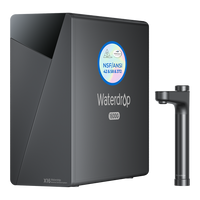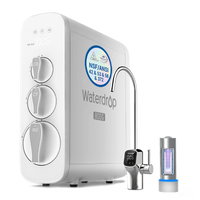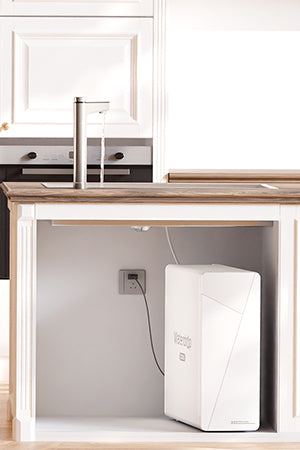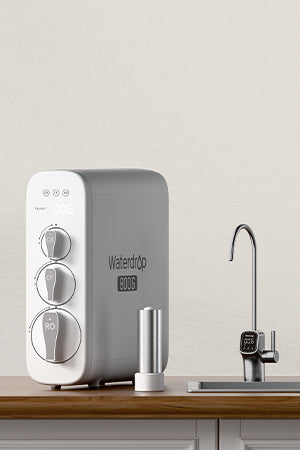Water hardness is a big deal when it comes to household water quality. When people move to Canada or travel within the country, one of the most common questions is: Is Canadian tap water hard or soft? The answer is simple: it depends on where you live since Canada's water comes from many natural sources. Some areas have very hard water, others have soft water right from the tap.
In this post we'll explain what water hardness means, how it affects your daily life and how tap water varies across Canadian provinces.
What Is Hard Water vs. Soft Water?
Before we get into Canada's situation, let's define the difference:
- Hard water has more dissolved minerals, mainly calcium and magnesium.
- Soft water has low levels of these minerals.
Neither is unsafe to drink but the mineral content affects taste, appliance efficiency, skin health and cleaning effectiveness.
Signs of Hard Water
- White or chalky deposits (limescale) on kettles, faucets and shower heads.
- Soap doesn't lather as well.
- Laundry feels stiff or rough.
- Dry skin or hair after showering.
Signs of Soft Water
- Easy soap lather and better cleaning efficiency.
- No chalky build-up in cookware or on faucets.
- Softer laundry and less detergent needed.
- Smoother skin and hair after bathing.
Is Canadian Tap Water Mostly Hard or Soft?
The hardness of Canadian tap water varies depending on the geology of the water source in each region. Water that flows through areas with limestone or chalk tends to be hard because it absorbs
calcium and magnesium . Regions with water from lakes or reservoirs often have softer water. Here's a general breakdown:
- Ontario and the Prairies (Alberta, Saskatchewan, Manitoba)
Mostly hard water. For example Calgary and Regina are known for very high mineral content.
- Quebec and British Columbia
Often soft water, especially for cities that get their water from mountain reservoirs. Vancouver has naturally soft water.
- Atlantic Canada (Newfoundland, Nova Scotia, PEI, New Brunswick)
Usually soft to moderately hard depending on the source.
Many northern communities use lakes and rivers so the water is soft.
So the answer is: Yes, Canadian tap water can be hard or soft—it depends on the region.
Why Does Water Hardness Matter in Canada?
While both hard and soft water are safe to drink, the hardness level has a practical impact on:
1. Household Appliances
Hard water causes scale buildup in kettles, boilers, dishwashers and washing machines. Over time this reduces efficiency and may shorten appliance life.
2. Cleaning & Laundry
Detergents and soaps interact differently with water hardness. In hard water areas you may need to use more laundry detergent or dishwasher soap. Soft water helps soap lather better, generally reducing cleaning costs.
3. Taste of Drinking Water
Some people like the mineral-rich taste of hard water, others prefer the smooth taste of soft water. For tea and coffee drinkers soft water tends to produce a cleaner taste.
4. Skin and Hair Health
Hard water leaves mineral residue on skin and hair causing dryness or irritation. Soft water rinses better, leaving skin smoother and hair shinier.
5. Plumbing Maintenance
Pipes in hard water areas are prone to scaling and reduced water pressure. Homes in soft water areas face fewer plumbing issues.
Can Canadians Soften Tap Water at Home?
Yes—Canadians in hard water areas often install home water softeners. A water softener uses a process called ion exchange which replaces calcium and magnesium ions with sodium or potassium.
Benefits of Using a Water Softener
- Appliances last longer with less limescale buildup.
- Less soap and detergent usage.
- Shinier dishes, cleaner clothes.
More comfortable showers for skin and hair.For households in very soft water areas, a softener isn't necessary and might actually change the taste of the water more than people prefer.
Is Hard Water Bad to Drink?
This is another common question. Health professionals say hard water is safe to drink. In fact, calcium and magnesium are
essential minerals in the human diet.
- Pros: Some studies suggest people in hard water areas may get extra dietary minerals.
- Cons: The main drawback is not health-related but rather aesthetic and household issues (scaling, taste, soap efficiency).
So while water hardness affects your home and comfort, it's not a safety risk.
Why Is Soft Water Found in Coastal and Mountain Regions?
Soft water is more common in areas where rainfall and snow-melt supply the reservoirs. For example: Vancouver's water comes from Capilano, Seymour, and
Coquitlam reservoirs , all fed by mountain snow-melt → very soft water.
Montreal's water is sourced primarily from the St. Lawrence River, so less mineral absorption → soft water. Groundwater in the Prairies runs through mineral-rich soil and rock, absorbing calcium and magnesium → hard water.
FAQs
Is Toronto tap water hard or soft?
Toronto's tap water is moderately hard, 120-130 mg/L of calcium carbonate. You'll see some scaling in kettles and appliances, but it's not too hard.
Why is Alberta water so hard?
Most of Alberta's water comes from groundwater and rivers that flow through limestone-rich areas, picking up minerals along the way. That's why Calgary has very hard water.
Does water hardness affect coffee and tea?
Yes. Soft water makes coffee and tea taste smoother and stronger, while hard water can taste flat or chalky. Some specialty coffee shops even filter and soften water to optimize taste. For the home, it is recommended to invest in a
reverse osmosis water filter to keep your water clean and safe.
Can you drink softened water in Canada?
Yes, but be careful. Softened water has added sodium or potassium depending on the system. For most people, this isn't a problem, but those on low-sodium diets may want to use a bypass tap for drinking.
Is bottled water in Canada hard or soft?
It varies by brand. Some bottled water companies use groundwater with natural hardness, while others purify water to remove minerals, making it soft. Check the label for mineral content.
Conclusion
So, is Canadian tap water hard or soft? The answer is: It depends on your province or city.
Vancouver and Montreal have soft water. Calgary, Regina and parts of Ontario have very hard water. Both are safe to drink, but hardness levels affect taste, appliance maintenance and daily comfort. If you live in a hard water region in Canada, a water softener can make life easier.
In short: Whether you're in soft water Vancouver or hard water Calgary, Canadian tap water is safe, regulated and reliable.











































































